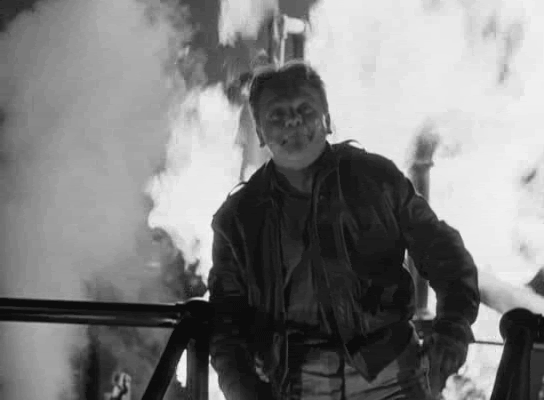This is cops and robbers with all the stops removed. Characters that are almost classical in their determination, and their obsession. Excitement that builds so rhythmically to a climax you want to scream. But you don't have to. Cody screams for all of us! HIGH SIERRA is a fine member of the genre. ASPPHALT JUNGLE another. But WHITE HEAT stands alone in its category; just as Cody Jarrett, as isolated as any character in mainstream movies, perches atop that famous gas tank.
Red, I did read this when you posted it, but now going back and reading it again, I find you have really captured the movie perfectly. The movie does stand alone, I bet a million dollars it was popular, but that no one at the studio wanted to go anywhere near it, ever again. It's so anarchic, so weirdly existential or maybe it's comically nihilistic, that it never recovers a sense of rightness, or goodness triumphing over evil. I can't imagine the studio really wanting to own up to this one. I think when it came out, there was a sense of outrage, and the fear driven studio just couldn't handle that. (Muffled laughter from Walsh and Cagney heard in the background).
And no one has really ever matched it, or thought about matching it! Think of it! A movie that Hollywood DOESN'T want to remake!

*Oops. Psycho did actually top White Heat for mind blowing anarchic uncomfortable-ness. Do you suppose Hitch saw White Heat?
********************************************
I wanted to mention the
'classical in their determination and their obsession' line you wrote. There is definitely something classical about Walsh's heroes. Your words bring Walsh's themes close to me, help me make my thoughts about him come clear. There is something universal and exceedingly human in Walsh's heroes. They seem to be on a quest (as life is a quest).... but it isn't necessarily an outward quest, even if that's the shape the drama takes. It's an inward quest, expressed through an outward one....a deeply individual quest, for self but for something else intangible. Something MORE. No, wait....something
BEYOND.
Walsh's characters are not greedy, nor are they foolish exactly. One could consider these great Walsh characters as knights of the round table, or Greek sailors and journeymen, a part of the Odyssey, on an epic voyage. They are not foolish as I said before, but something about the trip itself compels them to act in a way that is at once foolish, but also brave and noble. They must try.... and fail, gloriously fail to achieve a kind of balance and reality. Walsh loved those gracious stories of achievement, the adventures of travel, the Don Quixotes, who tried to tilt at giants. The magic. He felt himself to be more than a man, as we all do on occasion, when we reach beyond our grasp.... if we try, we might touch the sun, but we are always doomed to fall at some point. And I find Walsh comforting in his depiction of failure as a huge human endeavor to reach something unattainable. I love that point of elegance and grace and hope, and loss... just before the fall.

